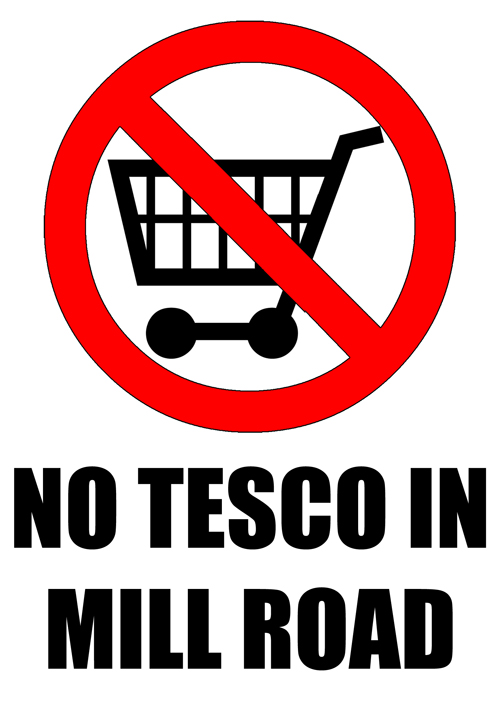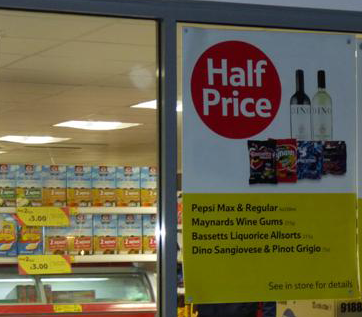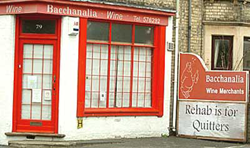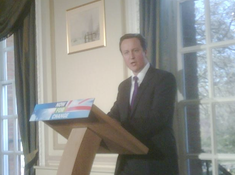 The staff of Cambridge's Mill Road Tesco deserve an award for tenacity in the face of eejits, as in merely opening the store they scored a gruelling victory over vested interests mounting a predominantly anti-capitalist campaign under the name of the No Mill Road Tesco Campaign.
The staff of Cambridge's Mill Road Tesco deserve an award for tenacity in the face of eejits, as in merely opening the store they scored a gruelling victory over vested interests mounting a predominantly anti-capitalist campaign under the name of the No Mill Road Tesco Campaign.The store has recently had an application to sell alcohol turned down - see Cambridge resident (expected to stand as an Independent in the next election) Richard Taylor's helpful and exhaustive account - on account of its being in a cumulative alcohol impact zone, which creates an assumption against granting new licences to sell alcohol.
What got me thinking was how alcohol gets into the hands of people in Mill Road with problematic drinking patterns in the first place. So as soon I was able I went to the end of Mill Road nearest town and walked up the mile-odd length, paying attention to the shops that sell alcohol.
Like any other consumers of alcohol, street-drinkers are partial to their favourites - most commonly Carls
 berg Special Brew or the other 9% lagers on sale. (The manufacturers observe the Memorandum of Understanding between the Department of Health and the Alcohol Industry on putting sensible drinking reminders on their cans, despite the fact that the contents of a single 500ml can of 9% lager, containing 4.5 units of alcohol, put the drinker above the government's recommendation of 2-4 units daily). Strong ciders also appeal to their palate, so I think it's significant - thanks again to Richard Taylor for his report - that Mill Roa
berg Special Brew or the other 9% lagers on sale. (The manufacturers observe the Memorandum of Understanding between the Department of Health and the Alcohol Industry on putting sensible drinking reminders on their cans, despite the fact that the contents of a single 500ml can of 9% lager, containing 4.5 units of alcohol, put the drinker above the government's recommendation of 2-4 units daily). Strong ciders also appeal to their palate, so I think it's significant - thanks again to Richard Taylor for his report - that Mill Roa d Tesco had pledged to sell no beers or cider above 5.5% alcohol - the equivalent of 11º proof in US measurements.
d Tesco had pledged to sell no beers or cider above 5.5% alcohol - the equivalent of 11º proof in US measurements.So No Mill Road were being rather disingenuous in making a noise about the local Tesco store's admittedly presumptious display of posters offering cheap wine: one doesn't often hear of pinot grigio-fuelled disorder.
 Which isn't to say that there hasn't been controversy with wine in Cambridge: in 2008, a wine-shop in the city's Victoria Road called Bacchanalia, which is opposite an Alcoholics Anonymous centre (and has a sister-store on Mill Road) displayed a sign proclaiming Rehab is for Quitters. Although one can appreciate the wordplay on one level, I think the fruit of the vine was more sinned against than sinning, not to mention people trying to piece their lives back together.
Which isn't to say that there hasn't been controversy with wine in Cambridge: in 2008, a wine-shop in the city's Victoria Road called Bacchanalia, which is opposite an Alcoholics Anonymous centre (and has a sister-store on Mill Road) displayed a sign proclaiming Rehab is for Quitters. Although one can appreciate the wordplay on one level, I think the fruit of the vine was more sinned against than sinning, not to mention people trying to piece their lives back together.The first thing I noticed was that shops genuinely serving specific communities - eg Chinese, Afro-Carribean, Malaysian - sold little or even no alcohol. On the other hand, the cynically-named International Food Store was in reality a wallful of shelves stocked
 with wines and spirits facing a wall of beers and soft drinks, with two thin aisles of snacks in between, and in between those huge plastic bottles of strong cider on the floor. Another general store had not only three different brands of 9% lager but also a variety of strong, cheap ciders, of the chemically-derived sort that Conservative leader David Cameron once remarked had "never seen an apple".
with wines and spirits facing a wall of beers and soft drinks, with two thin aisles of snacks in between, and in between those huge plastic bottles of strong cider on the floor. Another general store had not only three different brands of 9% lager but also a variety of strong, cheap ciders, of the chemically-derived sort that Conservative leader David Cameron once remarked had "never seen an apple".In all, there were five small, independent stores of the kind, say No Mill Road Tesco, in need of protection against the supermarket giant which were selling drinks that specifically fuel the thoroughfare's alcohol problems. I say specifically advisedly - when's the last time you saw 9% syrup or paint-stripper cider at a dinner-party or while getting together to watch the football?
Capitalism is insensate and must needs be fenced in by legal frameworks to prevent abuses like, for example, the sale of alcohol to minors, directly or through adults. Both the Co-op and Tesco, as far as I'm aware, will not sell to adults who are known to pass on to underage street-drinkers; so why ca
 n't smaller stores be leant upon to refuse to sell to people who are drunk, or who are known to drink in the street? Many people buy drinks from stores because pubs are forced to keep their prices high - releasing the legislative garotte strangling them wouldn't stop street drinking, but it could prevent people taking drinks home in a habit that has the potential to spiral dangerously, and would widen the cadre of social drinkers in pubs in whose self-interest it is not to let each other get out of control.
n't smaller stores be leant upon to refuse to sell to people who are drunk, or who are known to drink in the street? Many people buy drinks from stores because pubs are forced to keep their prices high - releasing the legislative garotte strangling them wouldn't stop street drinking, but it could prevent people taking drinks home in a habit that has the potential to spiral dangerously, and would widen the cadre of social drinkers in pubs in whose self-interest it is not to let each other get out of control.And while I'm on my wish-list, how about doubling the price of superstrong lagers and ciders?











No comments:
Post a Comment
Please feel free to leave a comment - Frugal Dougal.